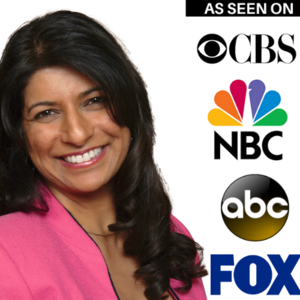Subscribe to The Next-Level Income Show
If you don’t find your bliss in what you’re doing, you won’t succeed. That is what Moneeka Sawyer did. Author and the host of Blissful Investor, Moneeka didn’t start with a lot of money. But she always knew real estate was her passion. In real estate, Moneeka struggled to find her bliss because she was working with people who didn’t respect her and her property. How can you find bliss in that? So once she decided to work with people that she likes, she was able to find her passion and her bliss. Be inspired to find your bliss today with as Chris Larsen brings in the infectious Moneeka to the show.
—
Watch The Episode Here:
Listen To The Podcast Here:
How To Find Your Bliss Through Real Estate With Moneeka Sawyer
You can get a free copy of our book at NextLevelIncome.com, just click on the Book link. Also, if you are an accredited investor, check out the Invest link to learn more about our self-storage fund as well as other institutional-quality real estate opportunities. You’re in for a treat. Moneeka Sawyer is going to share how you can choose bliss and use real estate to help you achieve true happiness in your life.
—
Moneeka Sawyer is indeed a blissful millionaire. She reached her financial freedom by turning $10,000 to over $5 million, working only 5 to 10 hours per month with very little stress. She is now on a mission to help as many other women as she can do the same.
—
Moneeka, welcome to the show.
Chris, it’s so nice to see you again.
It’s great to see you as well. I had such a blast on your podcast. I love your energy. I told you I had to have you on our show and share your story with our readers and audience. For those that don’t know your amazing story, maybe you could share a little bit about how you came to be the blissful investor you are now.
There are two stories that married when I was 21, but I’ll do the real estate one now and we’ll get to the other one. My story in real estate began when I was three years old. My parents came to this country as immigrants and newlyweds. They just had an arranged marriage and they had $200 in their pocket. My dad had heard that the golden ticket to wealth in the United States was to buy real estate. That was their ambition.
When I was born, you know how parents are. New parents are filled with love, joy and hope. They wanted to give me the best life possible. They started saving all their nickels and dimes. When I was three, they bought their first rental property. They were focusing on cashflow, but also in the California market, there was a lot of appreciation focus. Fast forward fifteen years, now I’m eighteen and they paid for my college education through real estate. They did the same for my two sisters. I got through college. I went to UC Berkeley.
I came out during a recession. I remember being so filled with fear like, “How was I going to get by? How was I going to do this adulting thing?” I thought about real estate, but I was like, “No, thank you.” Because although I had seen what it could do for our family, I had also seen my dad having sleepless nights because the rent is not coming in and getting calls at 2:00 in the morning for the toilets. We’ve all heard these horror stories. I lived it with my dad.
My focus since I was a very little girl was to live this idea of bliss. I did not want something in my life for the long-term because I viewed real estate as a long-term career. Even as an investor, I viewed it as a long-term thing. I didn’t want something in my life long-term that was going to make me miserable. I was like, “No, thank you. I don’t want in.” I remember the night I was sitting with my dad at the dinner table and I was scared. He said something to me that night that changed my life, “Moneeka, everybody has fear, stress and money issues. Do you want poor people money issues or rich people money issues?”
My first thought was, “Rich people have money issues? What? They’re just better money issues.” At that moment, I decided, “If I was going to have stress in my life anyway, let’s pick my poison.” I did head into the real estate path. Over time, my focus translated into that business, which is why I’m now called the blissful millionaire because I’ve streamlined my business and created systems so that my life can be truly blissful. That’s how my journey has been.
It’s so good. I was telling somebody that, “If you’re going to have problems, do you want rich people’s problems or poor people’s problems?” Robert Kiyosaki says something like that too. You said it and it’s true. The other expression I like is, “If you can write a check for something, you don’t have a problem anymore for that.” I love how you can take a different look at it. Was your dad’s career 100% real estate or did he do something else? Was he a professional of some sort?
No, it was his side hustle. My dad was an engineer. My mom was a doctor and they ran this business. At some point, my dad had 22 doors. He always bought nice homes in Silicon Valley and I’ve followed that path. I do executive home. He has nice homes with large rents and he did that as a side hustle. For me, to be honest, you talked about in my bio, I do 5 to 10 hours a month. That was never until lately my main job. It was my side hustle. I was in corporate. I was coaching and doing all this other stuff. This thing made me rich on the side. It’s amazing. That’s the thing about real estate. It can make you rich on the side without thinking about it. You think about it a little bit but it’s not like this all-time obsessive thing.
That’s a terrific way to talk about it. For me and you, it has turned into something a little bit bigger than a side hustle, but you can still go back to that and do it, which is wonderful. The people I coach, it’s like, “How do you take this and turn this into another passive or active stream of income, depending on how it is?” You said you started with $10,000 and turned it into $5 million. Let’s know a little bit more about that.
You know that I graduated during a recession. I had no money.
When was this exactly?
It was in 1991.
I graduated in a recession too. I was scared at first with real estate as well because both my parents lost their jobs in the recession because they were both in the real estate industry in the early ’90s. That was the first time it hit me and I was like, “This isn’t good.” I can relate a little bit.

Real Estate Bliss: Real estate can make you rich on the side without you even thinking about it.
In 1987 is when the laws changed for non-owner-occupied homes. The taxes changed. I don’t remember what year it was.
I think it was 1987, but don’t hold me to that, anybody.
My dad completely freaked out too. He had to re-adjust his whole real estate business. This is true. Real estate laws change but it’s still a good investment. This is the thing that I got from my dad. You have to be resourceful and be able to pivot. Don’t just expect that everything is going to be taken care of. The government is going to take care of you. You have to be a little bit flexible, and you need to. This is where bliss comes in. You keep your level emotionally and mentally so you can make good decisions and pivot. Before I answer your question, forgive me. I’m on a tangent. Let me explain bliss. Is that okay?
Absolutely because people think that like, “If I’m successful, I’ll be happy. If I find the right person, I’ll be happy. If I find the right job, I’ll be happy.” I like to say, “You have to be happy first and then you’ll be successful and have what you want.” That’s one of the reasons I wanted you to talk about bliss and what it means to you and your business.
Thank you for that. I always tell people, “We can’t control what happens outside of us, but we must control what happens inside of us.” That’s where bliss comes from. Bliss, from my perspective, is a deep sense of joy and contentment and the confidence that you can handle anything that comes your way. It’s about emotional mastery and emotional resilience. When we talk about real estate, what does that have to do with bliss? Warren Buffett says, “If you cannot control your emotions, you cannot control your money.”
Bliss is such an integral part of building a business and also having that business not take over your life. You want it to be a joyful experience. In everything you do, you want to support that and have that bliss support it. It’s a circular thing. That’s my perspective on how I built my business and why I’ve done it the way that I have. To answer your question, I decided to go into real estate. I made very little money and started saving 10% of that. Have you read the book The Richest Man in Babylon?
I have. It’s on my bookshelf back there. It’s one of the few I keep.
I love that, yet it’s tiny. It changed my life. I was saving 10%. I met the guy who is now my husband. When we got married, instead of for gifts, we asked for money. We took all of that money and we didn’t buy a car, TV, or sofa. We bought a house. That’s how we got started. In our primary residence, we put 5% down. You can put as low as 3.5%. We put 5% down and we bought our very first place. You get lower rates. It’s just better. It’s a write-off. We were paying less than our mortgage than we would have in rent, so it was great. We did that.
Within four years, that house had appreciated enough that we could take out the equity in that house and buy another one. We upgraded to a nicer home and decided to rent this one out. We took an equity line, used that as a down payment and bought the next place. Now, that would appreciate it. I took out another equity line and bought houses. You can see how this goes. That’s how the thing was built.
It’s not like I was on it constantly. Getting to an end to retirement happened in about 15 to 20 years. If I had been on it like watched every single, “We could do it right now,” I probably could have done it faster. For me, I call it the lazy woman’s way to real estate. I waited for things to appreciate and I kept my real estate money in real estate.
Our stories come from different backgrounds and coasts and yet we had a similar strategy. I did a similar thing. You mentioned you focused on executive properties. When I was preparing, I was like, “I don’t remember us talking about this when I was on your show.” What do you mean by an executive property? I don’t hear that thrown around very much.
I didn’t start there. This is how my strategy started to happen. David and I bought a nice home in a decent neighborhood. It was not the end game. This is something to remember. When you buy your first home, this is not your end game. This is your starter home. Buy some that will increase in value. Location isn’t, but it being the perfect home for you is not. We bought a home that worked for us. We house-hacked. We rented a bedroom so we could pay the mortgage. When we moved out, we bought a nicer home for ourselves.
You were married and you were renting a bedroom out?
Yes, we were. That’s the only way we could afford it.
If you’re reading and you’re married, you’re like, “We don’t want to do this.” These are some of the things you can sacrifice and make big gains.
It was only for a short period of time. We only had to rent a room out for two years. We’ve been married for many years. In the first two years, we made a little bit of sacrifice, but it was worth it because we could own that home and that started our career. That’s what has retired us with multiple millions of dollars. We started there and then I took the equity. I bought a nicer home for us and I rented that one out.
One of the things I realized with that was even though it was a nice home in a good location, I was now renting to people and I did not like the people that were interested in the house. It’s not that I didn’t like them. They were great, but they were not the kind of people I wanted to do business with. I was an executive. With them, they were constantly breaking the lease. There were no pets. They would get pets. There was no this. They wouldn’t pay rent.

Real Estate Bliss: You have to be resourceful and be able to pivot. Don’t just expect that everything’s going to be taken care of or that the government is going to take care of you.
There was this impression, “There was a differential between you and us. We are poor. We have to rent. You are rich. Look at all these houses.” You’ve got a differential and you saw that differential show up in the way that they took care of the house and treated me. I was so over it. Interestingly, I sold that house because I was like, “I don’t want to be dealing with this.” My husband was like, “You are going to regret that,” and I did. We bought it for $200,000. It’s now worth $1.5 million.
You always regret the properties. You want to own as much as possible.
That was one of the things I learned that was not blissful for me. It’s a decision that I was going to start doing business with people that I liked doing business with that would treat me and my homes with respect. As I evaluated that, I felt like the people that I had the most rapport with were people like me. They were executives. I made a decision that the homes that I rented from now on would be houses that people enjoyed who executives were.
I chose the renter first. We talked about a marketing avatar. It was my tenant avatar and then started to purchase houses that they would like to live in. That’s how I chose it. They’re not all, but they’re mostly executive homes. Even the ones that are not executive homes, an entrepreneur lives in there, which is interesting because they still have very much that same mentality that I have.
I talk to different investors, people on strategy calls and coaching clients. Everybody says, “I want to do what you do.” I said, “Let’s talk a little bit more about your background.” Fuquan, a friend of mine was on the show here a few episodes ago. He focuses on Section 8 housing and it’s different than what we’re talking about. He is super successful, but he is very comfortable in that niche. He likes those hairier projects. He paid $10,000 a door or something for this project. In this market where they’re selling for $100,000 or $200,000 a door, there are a lot of upsides there.
As you said initially, if you master your emotions, have good self-understanding and know what you like, where your talents are, and where your background is, you can make money in all kinds of areas of real estate. You’ve written three books and I’ve only written one. I feel like I got some catching up to do. Maybe you could tell us about the inspiration for each of those. Is Choose Bliss your latest book? That’s the one I have here.
Choose Bliss is my original book.
Maybe you could share with the audience your three books, who they’re written for and why you chose to write them.
Choose Bliss was written because I had been a life coach for many years and there were only so many people I could coach personally and reach. I was an executive life coach. You could tell this is the kind of people that I like to get along with. We called in because businesses were suffering. What I would find is that it wasn’t the business was suffering, but the big issue was these guys because, in those days, it was all men. Things have fortunately changed now.
With these guys, even though they have an amazing business, amazing house, beautiful wife, cute kids and a dog, they were miserable. They lose their inspiration for their businesses. I came in and taught them how to be happy and make the dream life that they were looking for. It wasn’t the stuff. It was, “What was happening inside of them that was not satisfied with it?”
I trained them on that and it changed so many lives around. I realized that I wanted to get this to a bigger audience. That’s when I wrote Choose Bliss to take all of those strategies that have worked in my own life and worked for my executive clients, put them in a book and get them out into the world. That’s what this was written for.
It came out at a time there was an election going on and a lot of frustration on both sides. That’s always true at an election. There’s all of the stuff. I traveled the world during that time to help people to stabilize. It’s always so challenging every four years. It got a huge reception. I got to talk. I got an incredible amount of fan mail and questions. One of the questions that I got most was, “Moneeka, how can you be successful when you’re broke and when you’ve got poor people problems?”
I realized that I had already taken care of that. My dad had already set me on that path. I wasn’t rich, but I knew I could take care of myself. I never doubted my own capacity to take good care of myself, get the medical care that I needed and do the things that I needed in life. That’s when I decided, “I’ve got this expertise in teaching people how to be blissful. I’ve got this expertise in real estate.”
That’s why I married the two and I started my podcast Real Estate Investing for Women. I then noticed there are a lot of people that don’t listen to podcasts, but they’re still interested in the conversation. That’s why I created the book Real Estate Investing for Women. It’s a compilation of the guests that got the most listens and responses from my audience. That’s why I put that together.
There’s another book called Your Amazing Itty Bitty Blissful Real Estate Investing Book. The amazing Itty Bitty publishing company requested that I put one together. That’s why I wrote that one. It’s amazing because I often will work with realtors and they give this book out. It’s so concise. It gives you so much of what I do, what I think and how to be blissful. It’s 35 pages.
It’s amazing, like your story, that you’ve married the two. I spent eighteen years in the medical device industry. You mentioned guys. I say guys because I’m from North East, Maryland. It’s above Virginia.
I say guys too.
We say guys, but it really was guys. The medical industry has been dominated by men and the world has changed a lot. It’s amazing that anybody, male, female, rich, poor, you can start off with a couple of thousand dollars in any background and end up a multimillionaire, which is why I love your story. You’ve written three books, executive coach, real estate investor and traveled around the world. How do you balance it all? Does your bliss get stretched sometimes trying to do that?
It does. There’s a false perception that bliss means happy all the time. Bliss means that you’re deeply content, that you have a predisposition to being joyful, but it doesn’t mean that you don’t have problems and challenges. It doesn’t mean that you don’t have access to the full emotional range. I get angry, depressed at times and overwhelmed. I also get euphoric. Anytime that you’re on either end of those ranges, it’s distracting. Bliss is what I call our home base. That’s where you want to come back to and live most of the time.
I get stretched and when I get stretched, I start to look at, “What is it that I’m doing that’s not working and re-adjust?” There’s a funny word that you used, Chris, balance. I don’t believe in balance because balance is to do things. There are too many parts of our life that require attention. Bliss is where you’re spending most of your time doing things that bring you joy. That is going to change in different parts of your life.
When you’re younger, you might put more emphasis on your career. You want to have a family and there’s more emphasis on your children. You’re retiring and you’re like, “I want to travel,” or preparing for that or getting the kids through school. Our lives and priorities change. All that is to understand what your core values are. Those don’t change. They might change a little bit, but your top ten are going to stay in the top 5 or top 10. They may move around a little bit based on your life circumstance, like these phases of life, “Do you have young children? Do you have kids going to college?”
You want to know what your core values are and build a life around those core values. When you start to notice you’re off balance like it’s not feeling good, you’re not blissful, not wanting to go to work or anything, going to bed early, taking afternoon naps because you’re depressed, you take a look at that and say, “What is it that’s not working with me? How have I changed? How is this not aligning with my core values?” This is hard because most people don’t live their life that way and most people don’t respect. They don’t understand why suddenly you’re starting to say no to things that you use to say yes to.
The people you love, hopefully, you can have the conversations and they’ll adjust with you. There’s some flow, but there are a lot of people that aren’t going to be okay with it. Your career might have to change. That emotional range is there to guide you. It’s as if they’re messengers for you, “Pay attention. This is what’s going on.” You look at those things. You adjust and then you come back to your bliss equilibrium.
You just got a free coaching session from the pro here and thanks for pointing it out because I like to say that too. Whether you’re an athlete, whatever it is we do, as human beings, we’re not always in perfect equilibrium and balance. We’re eating or not eating. We’re awake or resting. We’re training hard or taking days off. That’s how we’re built to be.
The idea of balance is a bit of a misnomer. It throws people off because they think that everything is always supposed to be the same. That’s not how we’re designed to live as humans, let alone in the world that we live in now. We talked about your books, career, investing and podcast. If people want to get in touch with you and learn more about any of those things, what’s the best way to find you?
You can find all of it at BlissfulInvestor.com. That has a download at the top of the page. That’s how you can get my story. I’m transparent about where I started. I bought a house just before the crash in 2001. I bought another house just before the crash in 2008. Still, I’ve been very successful in the industry. I want people to understand, “You don’t have to be perfect. You just have to be consistent.” You get to see that through that download. You can take that as a manual and create your own business out of it. That download is available and then you also get to see my podcast. The books are down at the bottom. You get to know there is some coursework on there. I released a TEDx. Hopefully, that will be up soon. Do you know what the TEDx is called?
I want to know.
That goes to the core of talking about bliss, mastering your emotions and doing that. You have all this experience working with executives. You’ve been around the world talking to millions of people. If you can go back and give yourself advice at 25, what would it be?
Don’t give in to your fear. Pay attention. See what it’s trying to tell you, but keep going.
I’m going to leave it at that, Moneeka. Thank you so much for being on the show and sharing your story with our audience. You can learn more about Moneeka and her story at BlissfulInvestor.com.
—
I hope you found this episode valuable. I have one more thing to give to you. We have a page for my coaching clients where you can get a free copy of my book as well as much more from previous guests on the show. Check out NextLevelIncome.com/coaching to get a free copy of my book, audiobook and much more. I’ll send you a copy of my book and cover all the shipping costs as a thank you for reading. Also, please like, share and take 90 seconds to give us a rating on Apple Podcasts.
Important Links:
-
Who is the Boss of You? – TEDx Talk
-
Apple Podcasts – The Next-Level Income Show
About Moneeka Sawyer
Moneeka Sawyer is the blissful millionaire. She reached her financial freedom by turning $10,000 to over $5,000,000 working only 5-10 hours per MONTH with very little stress. She is now on a mission to help as many other women as she can to do the same.
Moneeka is a TEDx speaker and hosts the top-rated podcast and radio show Real Estate Investing for Women. She has interviewed prestigious guests such as Leeza Gibbons, Dr. Joe Vitale, and Hal Elrod, and has been interviewed on dozens of podcasts including Entrepreneurs on Fire with John Lee Dumas, Hal Elrod’s Achieve Your Goals, and the Best Real Estate Advice Ever Show with Joe Fairless. Moneeka’s expertise, and bliss-filled laugh, have also been featured on stages with Suzanne Sommers, Martha Stewart, and Ice T & Coco at places like the Nasdaq Marketplace, Harvard, and Carnegie Hall, and on TV on NBC, CBS, ABC, and Fox reaching over 150 million people.
Love the show? Subscribe, rate, review, and share!
Join the Next- Level Income Show Community today:
Tagged: Real Estate Industry, Be Resourceful, Finding Bliss, Executive Property, Differential, Writing Books, Group 3




Subscribe to The Next-Level Income Show